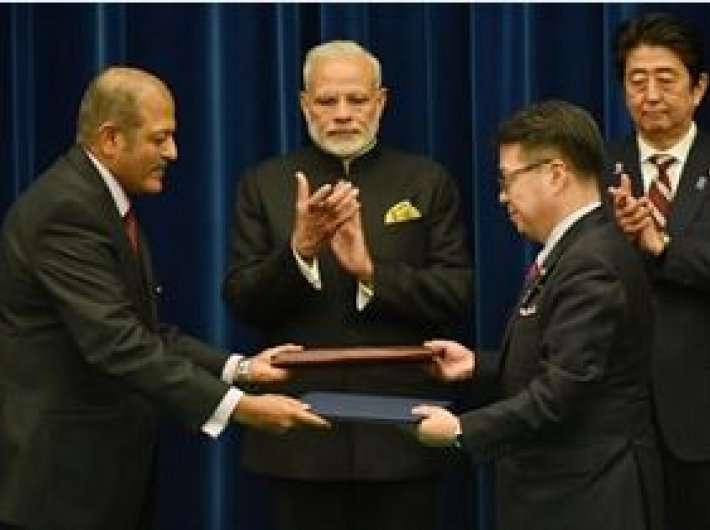However, total trade has come down to $14.51 billion in 2015-16 from $18.5 billion
The negative or slow growth in trade with Japan is a matter of concern for India in view of the fact that there is high potential for faster progress on goods and services trade, noted the Indian Embassy in Tokyo.
Bilateral trade between the two countries more than doubled between 2006-07 and 2012-13. However, total trade has come down to $14.51 billion in 2015-16 from a peak of $18.5 billion in 2012-13. In 2015-16, India's exports to Japan were $4.66 billion while imports were $ 9.85 billion. In 2016-17, India's exports further fell by 17.38% to $3.85 billion and imports by 2.2% to $9.63 billion.
“The share of India-Japan bilateral trade in Japan's total trade has been hovering around 1 percent but it is in the range of 2.05 to 2.34 per cent of India's total trade in the last five years,” it
said.
The embassy noted that economic relations between India and Japan have vast potential for growth, given the obvious complementarities that exist between the two Asian economies. Japan's interest in India is increasing due to variety of reasons including India's huge and growing market and its resources, especially the human resources. The signing of the historic India-Japan Comprehensive Economic Partnership Agreement (CEPA) and its implementation from August 2011 has accelerated economic and commercial relations between the two countries. During the visit of prime minister Narendra Modi to Japan in September 2014, PM Shinzo Abe pledged $35 billion in investment in India's public and private sectors over the next five years.
The two countries also set a target of doubling Japanese FDI and the number of Japanese firms in India by the year 2019.
India’s primary exports to Japan have been petroleum products, chemical elements/compounds, fish and fish preparation, non-metallic mineral ware, metalliferous ores & scrap, clothing and accessories, iron & steel products, textile yarn/fabrics, machinery, feeding-stuff for animals, etc.
India’s primary imports from Japan are machinery, iron & steel products, electrical machinery, transport equipment, chemical elements/compound, plastic materials, manufactures of metals, precision instruments, rubber manufactured, coal/coak and briquettes
Regarding investment, India has been ranked as the most attractive investment destination in the latest survey of Japanese manufacturing companies, conducted by the Japan Bank for International Cooperation (JBIC). Japanese FDI in India has increased in recent years but it still remains small compare to Japan's total outward FDI. In terms of cumulative FDI inflows into India, Japan is now India's third largest source of FDI. Japanese FDI in India grew exponentially from $139 million in 2004 to all time high of $5,551 million in 2008 due to mega deals particularly acquisition of Ranbaxy by Daichi Sankyo.
In the last two years, Japanese FDI into India increased from US$ 2.08 billion in 2014-15 to $2.61 billion in 2015-16 and further to $4.24 during the first nine months of FY 2016-17. The amount of Japan's cumulative investment in India since April 2000 to December 2016 has been $25.215 billion, which is nearly 8 per cent of India's overall FDI during this period. Japanese FDI into India has mainly been in automobile, electrical equipment, telecommunications, chemical and pharmaceutical sectors.
The number of Japanese affiliated companies in India has grown significantly in recent years. As of October 2016, there were 1,305 Japanese companies that are registered in India, an increase of 76 companies (6%) compared to 2015. These companies had 4,590 business establishments that are operating in India, which is an increase of 173 establishments (3%) compared to 2015.
